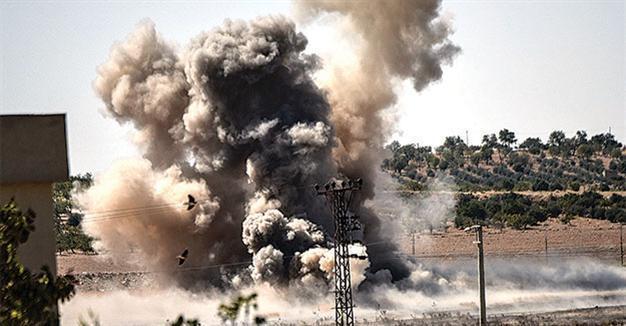Turkish military clearing mines from Syrian border
GAZİANTEP

This picture taken on September 1, 2016 in the Turkish-Syrian border town of Karkamis, in the southern region of Gaziantep, shows smoke rising close to the Syrian-Turkish border town of Jarabulus. Turkey denied a US claim it had agreed a truce with a Kurdish militia targeted as part of its week-old intervention in Syria but Turkish-backed fighters confirmed a lull in the fighting. AFP photo
Turkish military experts on Sept. 1 cleared mines from the area around the Syrian town of Jarablus captured from jihadists last week by Turkey, using controlled explosions that sent clouds of dust and smoke into the sky.Turkish military and Turkey-backed Syrian rebels, the Free Syrian Army (FSA), took Jarablus from the Islamic State of Iraq and the Levant (ISIL) in a lightning operation that entered its tenth day and the FSA is now enjoying full control of the town.
The de-mining operation on the Syrian side of the border was easily visible from the Turkish border town of Karkamış.
An AFP photographer on the border heard at least a dozen explosions.
ISIL jihadists are believed to have left large quantities of mines and explosives around Jarablus and operations to destroy them have been in progress since the capture of the town a week ago.
Artillery fire could also be heard on the other side of the border, the photographer added.
Turkey says its offensive inside Syria, which began with the capture of Jarablus, is aimed at ridding the border area not just of ISIL jihadists but also the Syrian Kurdish People’s Protection Units (YPG) that Ankara regards as a terror group.
But Turkish strikes on the YPG have worried the United States, which regards the group as an ally in the fight against ISIL.
Meanwhile, Russian Foreign Minister Sergei Lavrov discussed cooperation in Syria with U.S. Secretary of State John Kerry in a phone call on Sept. 1, the Russian Foreign Ministry said in a statement, Reuters reported.
As one of the latest developments in the country, Syrian opposition fighters have seized several areas in a rapid advance against government forces in central Hama province, prompting a wave of regime air strikes, AFP reported.
At least 25 civilians, including children, were killed in the strikes early Sept. 1, as fighting raged in parts of Hama, the Syrian Observatory for Human Rights said.
The Britain-based monitoring group said an alliance of rebel and jihadist forces had launched an offensive on Aug. 29 in Hama, which is south of the opposition-held Idlib province.
The alliance, which includes the jihadist Jund al-Aqsa force, is aiming to take control of the airport in Hama, from which regime helicopters fly regular sorties against opposition fighters.
“They are about 10 kilometers from the airport” in Hama, Syria’s fourth-largest city, said observatory director Rami Abdel Rahman, whose group relies on a broad network of sources inside Syria.
The U.N. Syria envoy Staffan de Mistura on the same day criticized a Damascus “strategy” of forced evacuation from Daraya following a brutal four-year government siege, warning that more besieged towns could follow.
De Mistura told reporters in Geneva that there were “indications that after Daraya we may have other Darayas,” adding that “there is clearly a strategy at the moment to move from Daraya” to other besieged areas “in a similar pattern.”
Hind Kabawat, a member of Syria’s main opposition group, the High Negotiations Committee, told Reuters in an emailed comment that the Syrian opposition plans to unveil its plans for a political transition to help end the country’s five-year war at a meeting of ministers in London next week.
This would include the formation of a transitional governing body with full executive powers, she said.
Other details would include the length of the transition period, a mechanism to ensure fair representation of minorities and plans for the reform and reconstitution of state institutions, Kabawat said.
Meanwhile, Gernot Erler, the German government’s point man on Russia, urged the United Nations on Sept. 1 to seek sanctions against Syria for two chlorine gas attacks on civilians, despite Moscow’s threat to veto such a measure.
“The United Nations should prepare clear sanctions, despite the Russian veto threat,” Erler told Germany’s Neue Osnabrücker Zeitung in an interview.
“Moscow is obviously more concerned about being seen as a friend of the criminal Assad regime than in taking joint action and sanctions against this provocative treaty violation,” Erler, a member of the Social Democrats, the junior partner in Chancellor Angela Merkel’s coalition, told the newspaper.
















